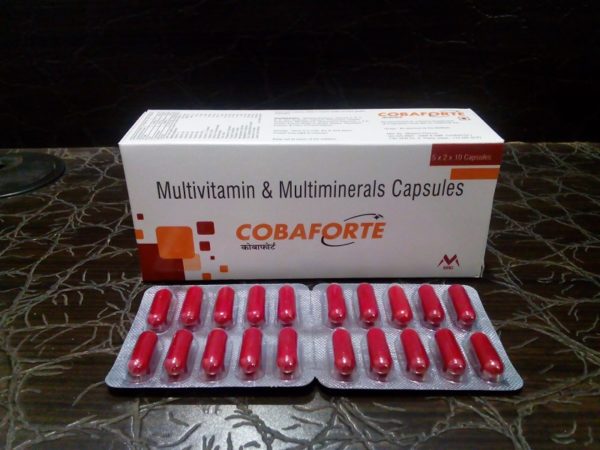COBAFORTE
COMPOSITION:METHYLCOBALAMINE 250MCG+VIT. A 5000 IU+VIT. B1 6MG+VIT. D3 400 IU+VIT. B2 5MG +VIT. B6 2MG+VIT. B12 5MCG+VIT. C 75MG+ VIT. E 201U+CALCIUM PANTOTHENATE 5 MG+NICOTINAMIDE 45 MG +FOLIC ACID 1.5 MG+COPPER SULPHATE 2 MCG+
POTASSIUM IODINE 1MG+MANGANESE SULPHATE 1.5MG+ MAGNESIUM SULPHATE 30MG+SELENIUM DIOXIDE 40MCG+ZINC SULPHATE MONOHYDRATE 2.20 MG+LACTIC ACID BACILLUS 60 MILLION SPORES+POTASSIUM SULPHATE 10MG (in food)
- Reviews (0)
- iNDICATIONS
- DESCRIPTION
Be the first to review “COBAFORTE”
Energy production
● Management of healthy skin, hair and nails
● Used in cardiovascular diseases
● Pernicious anemia
● Used in kidney stones
● Strengthens the immune system
● Regulates blood pressure
● Production of red blood cells
● Regulates carbohydrate metabolism
● For rheumatoid arthritis and osteoarthritis
● Used in neurodegenerative diseases
● Used in diabetes
● Used in Hepatitis C
● Used in pregnancy
● Antioxidant activity
● For digestion
● Used for common cold
● Minimize digestive complaints
B Complex Vitamin:
Vitamin B1:
Vitamin B1 is beneficial in cardiomyopathy and chronic heart failure as it improves cardiac function. Vitamin B1 also improves peripheral neuropathy, nerve function and chronic pain and is known as 'the brain energiser.' Vitamin B1 also improves the body's ability to withstand stressful conditions and strengthens the immune system. Vitamin B1 is an important nutrient for patients with Alzheimers, an overactive thyroid, serious mental health or addiction issues and learning difficulties.
Vitamin B2:
Vitamin B2 is an antioxidant involved in energy production. It is one of the major nutrients involved in recycling glutathione. Riboflavin limits the cell damage caused by stroke or heart attack and minimises respiratory damage from various toxins. Low vitamin B2 levels increase the risk of depression.
Niacinamide:
Niacin and niacinamide are forms of Vitamin B3. Vitamin B3 is found in many foods including yeast, meat, fish, milk, eggs, green vegetables, beans, and cereal grains. Niacin and niacinamide are also found in many vitamin B complex supplements with other B vitamins. Niacin or niacinamide is used for preventing vitamin B3 deficiency and related conditions such as pellagra. Each of these forms of vitamin B3 is used for schizophrenia, hallucinations due to drugs, Alzheimer's disease and age-related loss of thinking skills, chronic brain syndrome, depression, motion sickness, alcohol dependence, and fluid collection (edema).
Vitamin B6:
Vitamin B6 is a natural antihistamine and detoxifier and helps to lower homocysteine levels. It is beneficial in diabetes, cardiovascular diseases, arthritis and helps to boost the immune system and is also useful in neurological and mental disorders.
Folic Acid:
Folic acid is a type of B vitamin that is normally found in foods such as dried beans, peas, lentils, oranges, whole-wheat products, liver, asparagus, beets, broccoli, brussels sprouts, and spinach.
Multiminerals:
Calcium:
Calcium is crucial in growing new bone and maintaining bone strength. Calcium supplements are standard for treating and preventing osteoporosis -- weak and easily broken bones -- and its precursor, osteopenia.
Zinc:
Zinc is an essential mineral found in every tissue of the body. It is present in every known class of enzyme and, therefore, a player in all biochemical pathways the body undertakes.
With its pervasive role, no wonder zinc has so many benefits for human health. Zinc is essential for growth, protein production, cell division, DNA synthesis, immune function, wound healing, bone and teeth formation, skin renewal, brain activity, proper nervous system function.
Copper:
Copper is a mineral. It is found in many foods, particularly in organ meats, seafood, nuts, seeds, wheat bran cereals, grain products, and cocoa products. The body stores copper mostly in the bones and muscles. The liver regulates the amount of copper that is in the blood. Copper is used as medicine. Copper is used for treating copper deficiency and the anemia it may cause. Malnourished infants can also have copper deficiency. Copper is also used for improving wound healing, and treating osteoarthritis and brittle bones (osteoporosis).






Reviews
There are no reviews yet.